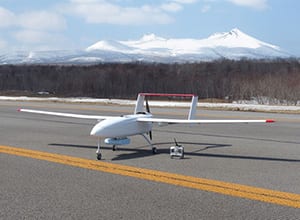Next Generation Aeronautical Innovation Hub Center

The Unmanned Airplane for Radiation Monitoring System (UARMS)
Unmanned aircraft systems (UAS) have already started making an impact in fields like pesticide application and aerial photography. As UAS continue to develop, the technology could find its ways into areas ranging from disaster monitoring and other public-use applications to infrastructure maintenance, parcel delivery, and other new commercial applications.
By researching and developing basic technologies for improving the operational safety and mission capabilities of small UAS, JAXA is helping expand the scope of the technology and contributing to the realization of a safe and prosperous society.
JAXA is also conducting research and development on operation technology, focusing on optimizing the efficiency and environmental compatibility of UAS as demand grows, to make a difference in the economic and social dimensions, as well.
Unmanned Aircraft System (UAS) Traffic Management(UTM)
To operate small UAS safely beyond visual range and in populated areas, JAXA carries out research on technologies for operation management, safety evaluation, and safety improvement.
Technologies for Enhancing the Flight Safety and Expanding the Mission Capabilities of Small UAS
In order to expand the mission capabilities of small UAS, JAXA is developing two technological concepts: VTOL technology—which will make it possible to ensure better take-off/landing operability and enhance flight range at the same time—and morphing-wing technology for enabling safe flight under adverse weather conditions.
Cooperative operation of multiple MAV for complex mission capabilities
Unmanned Airplane for Radiation Monitoring System (UARMS)
JAXA works on the development of a small unmanned aerial system that is suitable for radiation monitoring by using a small long-endurance UAV equipped with a radiation detector that Japan Atomic Energy Agency (JAEA) has been using on unmanned helicopters and/or with another detector with improved real-time monitoring features.
Comments are closed.